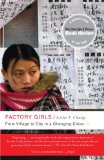Summary | Excerpt | Reviews | Beyond the Book | Readalikes | Genres & Themes | Author Bio

Critics' Opinion:
Readers' Opinion:
First Published:
Oct 2008, 432 pages
Paperback:
Aug 2009, 448 pages
 Book Reviewed by:
Book Reviewed by:
Karen Rigby
Buy This Book
1
Going Out
When you met a girl from another factory, you quickly took her measure. What
year are you? you asked each other, as if speaking not of human beings but of
the makes of cars. How much a month? Including room and board? How much for
overtime? Then you might ask what province she was from. You never asked her
name.
To have a true friend inside the factory was not easy. Girls slept twelve to a
room, and in the tight confines of the dorm it was better to keep your secrets.
Some girls joined the factory with borrowed ID cards and never told anyone their
real names. Some spoke only to those from their home provinces, but that had
risks: Gossip traveled quickly from factory to village, and when you went home
every auntie and granny would know how much you made and how much you saved and
whether you went out with boys.
When you did make a friend, you did everything for her. If a friend quit her job
and had nowhere to stay, you shared your bunk despite the risk of a ten-yuan
fine, about $1.25, if you got caught. If she worked far away, you would get up
early on a rare day off and ride hours on the bus, and at the other end your
friend would take leave from work--this time, the fine one hundred yuan--to
spend the day with you. You might stay at a factory you didn't like, or quit one
you did, because a friend asked you to. Friends wrote letters every week,
although the girls who had been out longer considered that childish. They sent
messages by mobile phone instead.
Friends fell out often because life was changing so fast. The easiest thing in
the world was to lose touch with someone.
The best day of the month was payday. But in a way it was the worst day, too.
After you had worked hard for so long, it was infuriating to see how much money
had been docked for silly things: being a few minutes late one morning, or
taking a half day off for feeling sick, or having to pay extra when the winter
uniforms switched to summer ones. On payday, everyone crowded the post office to
wire money to their families. Girls who had just come out from home were crazy
about sending money back, but the ones who had been out longer laughed at them.
Some girls set up savings accounts for themselves, especially if they already
had boyfriends. Everyone knew which girls were the best savers and how many
thousands they had saved. Everyone knew the worst savers, too, with their lip
gloss and silver mobile phones and heart-shaped lockets and their many pairs of
high-heeled shoes.
The girls talked constantly of leaving. Workers were required to stay six
months, and even then permission to quit was not always granted. The factory
held the first two months of every worker's pay; leaving without approval meant
losing that money and starting all over somewhere else. That was a fact of
factory life you couldn't know from the outside: Getting into a factory was
easy. The hard part was getting out.
The only way to find a better job was to quit the one you had. Interviews took
time away from work, and a new hire was expected to start right away. Leaving a
job was also the best guarantee of getting a new one: The pressing need for a
place to eat and sleep was incentive to find work fast. Girls often quit a
factory in groups, finding courage in numbers and pledging to join a new factory
together, although that usually turned out to be impossible. The easiest thing
in the world was to lose touch with someone.
For a long time Lu Qingmin was alone. Her older sister worked at a factory in
Shenzhen, a booming industrial city an hour away by bus. Her friends from home
were scattered at factories up and down China's coast, but Min, as her friends
called her, was not in touch with them. It was a matter of pride: Because she
didn't like the place she was working, she didn't tell anyone where she was. She
simply dropped out of sight.
Excerpted from Factory Girls by Leslie T. Chang Copyright © 2008 by Leslie T. Chang. Excerpted by permission of Spiegel & Grau, a division of Random House, Inc. All rights reserved. No part of this excerpt may be reproduced or reprinted without permission in writing from the publisher.





The Funeral Cryer by Wenyan Lu
Debut novelist Wenyan Lu brings us this witty yet profound story about one woman's midlife reawakening in contemporary rural China.
Your guide toexceptional books
BookBrowse seeks out and recommends the best in contemporary fiction and nonfiction—books that not only engage and entertain but also deepen our understanding of ourselves and the world around us.